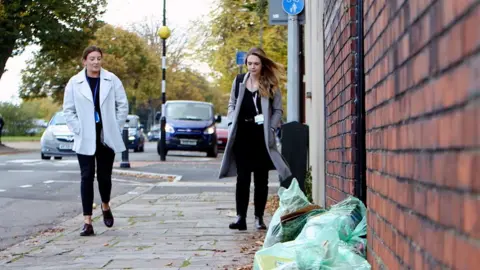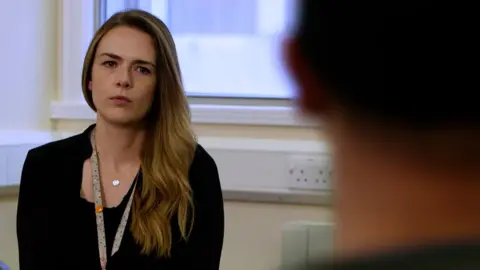Covid-19: 'My pandemic work with dangerous prison leavers'
Working from home during a pandemic has brought extra challenges for probation officers who work with serious offenders after their release from prison. Many have had to handle unpleasant subject matter in their own homes, as they deal remotely with violent or sexual offenders.
I spent the day with a member of the probation team that works with the 50 most dangerous male offenders in Cardiff, to see how they are managing.
Salli Dixon is part of the special team of probation officers usually based at a police station.
While some face-to-face appointments have continued, whether in the office or the offender's doorstep, others have to be done over the phone or by video call.
The pandemic also means more of the work is done remotely from home, including work with sex offenders.
"It makes it a little more hard to switch off mentally, and you're having really difficult conversations in your home environment, which feels intrusive," she says.
"But it hasn't made the service any less effective. We can't have a less effective service - we protect the public, so we've just had to adapt."
Her first call of the day is with a registered child sex offender, who is living in a halfway house after recently being released from prison.

He's tested positive for Covid-19 and has been moved into isolation quarters, meaning their appointment must now be over the phone.
He tells her he's anxious about plans to find him his own flat where he would be living alone full-time.
The length of time prison leavers spend in approved premises like a halfway house has been reduced during the pandemic.
"It's a little early if I'm honest - far, far too early," he says.
"When my mind is in a corner and up against a wall - it just goes 'right where is the way out? The way out is to go back to prison'."
His anxieties are kicking in, meaning his risks increase, Salli explains.
"He has got 16 or 17 instances of breaching his restrictions, usually by going too close to an area where there are children - like a nursery or school. He says he does that because he wants to self-sabotage and go back into prison," she says.
"So when he feels that he is being moved into his own accommodation, where he'll be by himself, he gets anxious and he thinks it's easier to just do something that would warrant him going back inside.
"The risk to the public would be that he would commit a child contact sex offence. He hasn't done that yet, but we can't rule out that he wouldn't."

How does she feel discussing the nature of his offending?
"We're not completely desensitised as probation officers, because we still hear things that shock us," she says.
"No matter how long you've done a job it is quite difficult sometimes and quite unusual to hear somebody talk candidly about their sexual views towards children."
The small team deals with complex cases - like repeat domestic violence or sex offenders who also have additional issues, such as a personality disorder, mental health problems or drug and alcohol misuse.
Known as Wisdom (Wales Integrated Serious and Dangerous Offender Management), they have a reduced case load to reflect the risks posed, as well as more resources than typical probation officers.
Her second case of the day is able to come to the office. He committed a sex offence against a vulnerable adult and was released earlier this year after decades in prison.

Much has changed since he was a young man on the outside, and he says the pace of life compared with prison has felt overwhelming at times.
Weeks after his release, lockdown was announced and he too wonders whether it would be better to be back in prison.
"We've done a lot of work around what's going well and the reasons he wants to stay out," says Salli.
"If you reinforce that enough, they will make changes and they will stay out. He's done phenomenally well."
She still carries out some home visits, but they're now on the doorstep, which naturally makes the job more challenging.
"We're risk assessors, it's what we're trained to do. So even though we might not be able to physically go inside, we'll do everything we can to make sure that everyone is safe."
The use of video calls also means more checks can be done in a day, but if Salli is working from home she has to make sure none of her personal items are on view.
"I would try and have video calls in the office because not only is it safer but I'm in the right frame of mind to be talking to somebody [in that] environment."
'Change lives'
Covid-19 has also brought greater practical challenges for the men she works with.
"It's made it more difficult for people to access basic things like housing, money and universal credit, signing up at the doctors, getting a prescription. We've had to be more hands on in terms of helping people get set up."
The rewards keep her going, she said, and she is proud of the good the team is doing for the wider community.
"We change people's lives," she says.
"I wouldn't do it if I didn't enjoy it. It's got its ups and downs and you know you can't help change everyone. You have to manage your expectations about what you can help people achieve."